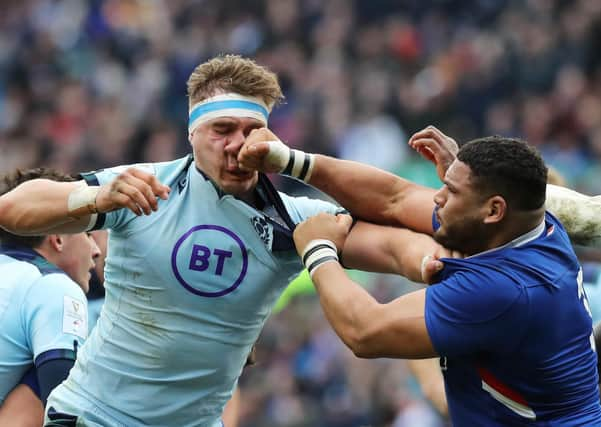Allan Massie: Let’s call the whole thing off and start Six Nations again next year


Given the uncertainty as to the duration of the epidemic and the congestion of rugby fixtures when the ban is eventually lifted, it would probably be sensible to declare this year’s Six Nations void. Nobody is in a position to win a Grand Slam and the top of the table might be decided by these wretched and unnecessary bonus points or, even more unsatisfactorily, by points differentials. So let’s call the whole thing off and start again next year when we might even have a decent spring instead of February’s King Lear on the blasted heath weather.
Looking back briefly, last Sunday’s win at Murrayfield was satisfactory, perhaps more than that, given that this was a very good French team which had already beaten England, Italy and Wales. It is difficult to know whether the red card shown to the French prop Mohamed Haouas influenced the result. Perhaps not, for Scotland had been the better team in the first half, even if just behind on the scoreboard.
Advertisement
Hide AdAdvertisement
Hide AdThe paradox of rugby today is that it is both a cleaner and more law-abiding game than it was in the dear old amateur days but also a more violent and therefore more dangerous one. If you compared the two red cards dealt out last week, one to Haouas, the other to Manu Tuilagi,there could be no doubt that it was the Englishman’s offence, committed in the run of play rather than in a scuffle after the referee had blown his whistle, that might have done the more serious damage. He was lucky not to make contact with George North’s head, and, given the power of his no-arms tackle North himself was even more fortunate. But while the French agreed that Haouas had been guilty of an unacceptable act deserving a red card, the ineffable Eddie Jones disputed the decision to send Tuilagi off.
Actually, contrary to the general view I thought him unlucky to be dismissed. Admittedly he punched Jamie Ritchie , and a punch is nowadays, usually and rightly, seen as cause for sending off. But there’s a difference, to my mind, between an unprovoked punch and one delivered in a scuffle which has been going on for some time and involves most of the players. I would have preferred the referee to say “the original penalty to Scotland stands” (as it did), then summon the two captains and say: “control your players – that’s your responsibility – and if there’s more nonsense like this, the pair of you will go to the sin-bin for ten minutes”. But I suppose a referee who spoke like that would himself be in trouble with the high heid-yins.
Such brawls are of course a bad advertisement for the game (even if many rugby men rather relish them – some women also), but I think holding captains responsible for the good behaviour of their players and punishing them when discipline breaks down may often be the best thing to do. Captains today are often quick enough to try to put the referee right; let them see to their own players’ good conduct.
Not of course that referees themselves should be free from scrutiny. For one thing matches are lasting too long, and referees bear some responsibility for this. The England-Wales one endured for just over two hours, including the half-time break. Delays caused by treatment of an injured player are unavoidable. Delays caused by repeatedly re-set scrums, the refusal of the side with the throw at the lineout to get into position until they have held a planning conference, and long drawn-out confabulations involving the referee, assistant referees and the TMO, are all as unnecessary as they are irritating. Moreover they destroy the rhythm of a match.
The first two are easily remedied by a strong-minded referee ready to penalise disrupters and laggards, though I would also add that the game would be speeded up and therefore improved if it was not permissible for a team to opt for another scrum when awarded a free-kick.
As for the long confabulations, if there is no quick and clear agreement, the referee should stand by his own immediate judgement of fact. After all, the Laws of the game still – I think – declare that the referee is the sole judge of fact and fair play. It’s not as if these lengthy discussions among the officials always arrive at an indisputable answer. Far from it indeed.
Comments
Want to join the conversation? Please or to comment on this article.